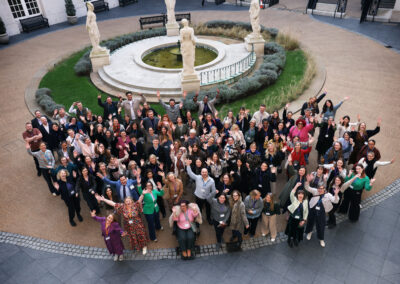The wedding industry, renowned for its opulence and extravagance, has often been criticised for its environmental impact. Amidst the glitz and glamour, a significant amount of waste is generated, much of which ends up in landfill. However, a growing movement is advocating for a more sustainable approach, and a large part of that is moving towards a circular economy.
The circular economy, a concept that promotes the reuse, repair, and recycling of resources, offers a promising solution to the waste problem in the wedding industry. By adopting circular principles, businesses can reduce their environmental footprint, enhance their brand reputation, and potentially save costs.
Is it possible for the wedding industry to become circular?
The short answer is yes. The circular economy can be applied to various aspects of the wedding industry. By adopting a circular mindset, businesses can reduce their environmental footprint while also improving their bottom line.
Many businesses across the industry are embracing circular principles by investing in energy-efficient systems, reducing water consumption, and implementing waste management programs. As an example, we’ve seen catering partnering with local farms to source sustainable ingredients for their wedding menus, minimising food waste and supporting their local economy.
The circular economy, is a model that aims to minimise waste and maximise resource efficiency, and it’s not exclusive to the wedding industry. It has been successfully implemented in various sectors, demonstrating its versatility and potential benefits. Examples of the Circular Economy in Action:
Technology: Companies in the technology sector have embraced the circular economy by designing products that are easy to repair, upgrade, and recycle. For instance, Apple has introduced systems that allow customers to trade in old devices for discounts on new ones, extending the life of products and reducing waste.
Fashion: The fashion industry, often criticised for its heavy environmental impact, has begun to explore circular models. Some brands are adopting rental services, allowing customers to wear garments without purchasing them. Additionally, initiatives like clothing recycling and upcycling are gaining momentum, reducing waste and promoting sustainable practices.
Food Service Industry: The food industry has implemented circular practices through initiatives like food waste reduction, composting, and regenerative agriculture. For example, some supermarkets have partnered with food banks to donate surplus food, reducing waste and supporting local communities.
These examples illustrate how the circular economy can be applied to a wide range of industries, demonstrating its potential to drive innovation, reduce waste, and create more sustainable business models. By adopting a circular mindset, businesses in the wedding industry can tap into these benefits and contribute to a more sustainable future.
Business Benefits Beyond Sustainability
The circular economy offers numerous business benefits for the wedding industry, extending far beyond environmental sustainability. By adopting circular practices, businesses can:
1. Improve Financial Performance
Circular practices can lead to significant cost savings by reducing waste, minimising material consumption, and extending the lifespan of assets. This can translate into increased profitability. Some wedding businesses are exploring new revenue streams based on circular principles. For example, rental companies can offer a wider range of sustainable items for hire, generating additional income.
Circular practices can help businesses mitigate risks associated with supply chain disruptions, material shortages, and regulatory changes. By relying on closed-loop systems, businesses can reduce their dependence on external factors.
2. Enhance Customer Relationships
Consumers are increasingly conscious of sustainability and ethical practices. By demonstrating a commitment to the circular economy, businesses can attract and retain customers who share their values. Circular practices can help businesses stand out from competitors. By offering sustainable and ethical products or services, businesses can create a unique brand identity and build customer loyalty.
A reputation for sustainability can enhance a business’s public image and attract media attention. This can lead to increased brand awareness and customer trust.
3. Drive Innovation and Creativity
The circular economy encourages innovation and creativity. By exploring new ways to reuse and repurpose materials, businesses can develop unique products and services that meet the needs of their customers. Circular practices often involve collaboration with local communities and businesses. This can foster stronger relationships and create opportunities for partnerships.
4. Contribute to a Sustainable Future
Circular practices often involve ethical sourcing and fair labour practices, promoting social responsibility and equity. A circular economy can help businesses become more resilient to economic downturns and environmental challenges. By relying on closed-loop systems, businesses can reduce their vulnerability to external shocks.
In conclusion, the circular economy offers a multitude of business benefits beyond sustainability. By adopting circular practices, wedding businesses can improve their financial performance, enhance customer relationships, drive innovation, and contribute to a more sustainable future.


